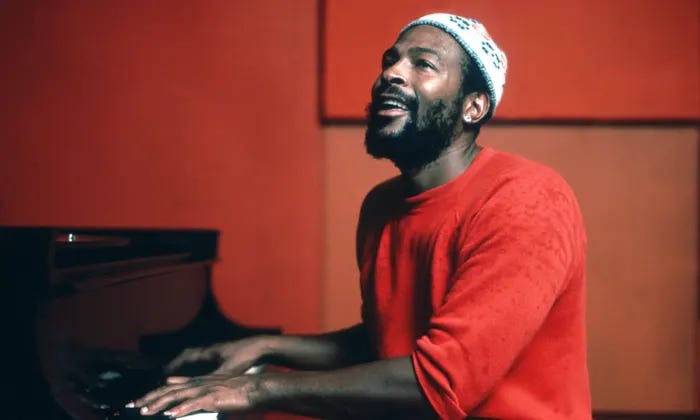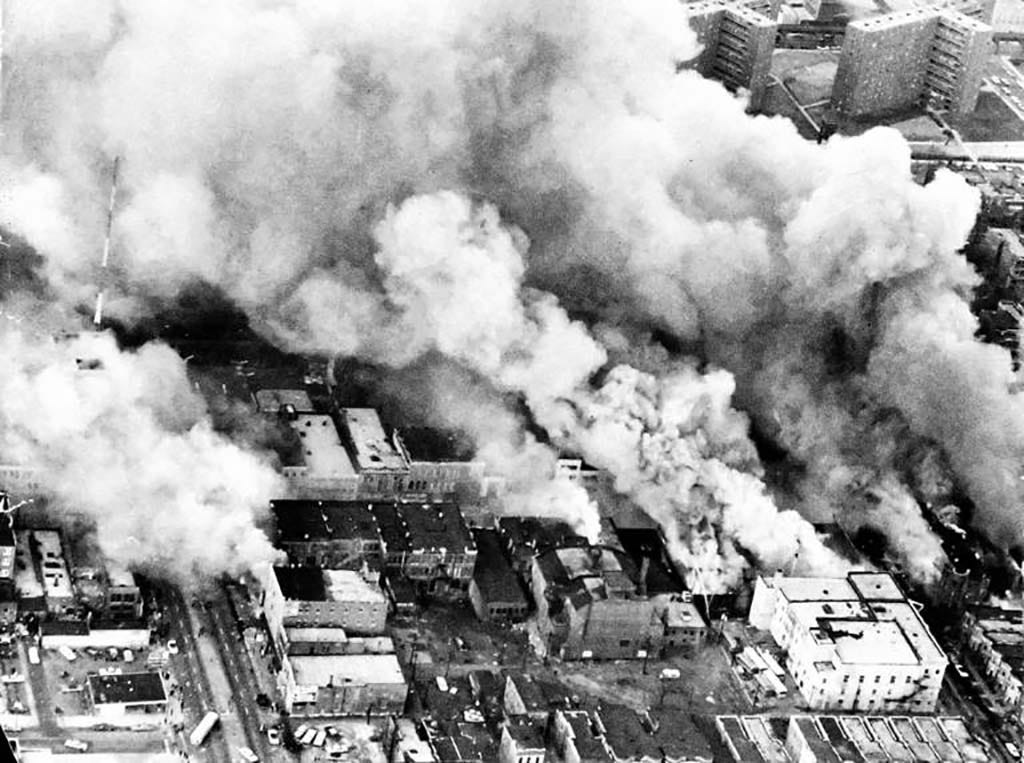One Mic Black History Newsletter #6
Today we tell the stories of the life of Marvin Gaye, Oscar Micheaux and lastly the Holy Week Uprising
Good Day, Fam, Welcome Back to One Mic History Newsletter. Thank you for joining us today. I appreciate you. If you enjoy stories like this you can find more stories like this on One Mic History. You can also join us on Instagram, TikTok and YouTube at One Mic History.
What’s Going On?
Marvin Pentz Gay Jr. was born April 2, 1939, He was a singer-songwriter-producer who helped to shape the sound of Motown in the 1960, earning him the nickname "Prince of Motown" and "Prince of Soul".
Gaye’s father was a preacher; his mother was a domestic worker. Gaye sang in his father’s church in Washington, D.C., Gaye was blessed with an exceptionally range and a great technical prowess. In 1958 Gaye became a member of the nationally known doo-wop group, the Moonglows. The group recorded “Mama Loochie” and “Twelve Months of the Year, but doo-wop dissipating rapidly in the late 1950s, soon the Moonglows disbanded, and 20 year old Gaye moved to Detroit, where Berry Gordy, Jr, was forming Motown Records.
Gaye was set on being a crooner, In the same vain as Nat King Cole. He enjoyed his first break with “Stubborn Kinda Fellow” (1962), This was the first of a long string of hits, including “I’ll Be Doggone” (1965), and “I Heard It Through the Grapevine” (1968), as well as a series of successful duets, most notably with Tammi Terrell (“Ain’t Nothing Like the Real Thing” [1968]).
Gaye became his own producer for What’s Going On (1971), it was the magnum opus of his career. A series of jazz-influenced songs about America’s political and social woes, this concept album was to paint a picture of the landscape of America’s African American community. "What’s Going On was a critical and commercial sensation, that included the chart-topping singles “What’s Going On,” “Mercy Mercy Me (The Ecology),” and “Inner City Blues (Make Me Wanna Holler).” all of this, in spite of the fact that Berry Gordy, fearing its political commentary as well as its stand against the Vietnam War, and argued against its release.
Other major artists like Stevie Wonder, followed Gaye’s lead and acted as producer of their own records. In 1972 Gaye wrote the soundtrack for the film Trouble Man, the album mirrored his own sense of insecurity. Let’s Get It On, released in 1973 I Want You (1976) and Here, My Dear (1979) that dealt with Gaye’s divorce from Gordy’s sister Anna Gordy Gaye.
Gaye’s growing addiction to cocaine only worsened his issues, He struggled with crushing depression and was also indebted to the Internal Revenue Service, causing him fled the country, living in exile in England and Belgium, In the eighties, he worked only sporadically. In 1982, he left Motown and signed with Columbia
His comeback hit, “Sexual Healing,” in 1982 was a worldwide sensation, the song that signaled his comeback. Back in united states living in LA with his parents, His 1983 “Sexual Healing” tour, was fuel with confusion and chaos causing Gaye to fall into emotional disarray.
On April 1, 1984, during a family dispute, Gaye was shot to death by his Father during an altercation. In 1987, Gaye was inducted into the Rock and Roll Hall of Fame, and in 1996 received a Grammy Award for lifetime achievement.
Within Our Gates
For over a century, African American filmmakers have sought to be represented in the film industry. As Hollywood developed in the early 1900s, Black directors sought to challenge the stereotypes that were pervasive in the industry. The most prolific and tireless voice during this period was Oscar Micheaux, who blazed trails in Black American cinema beginning with his 1919
Born in 1884 in Metropolis, Illinois, He worked briefly as a Pullman porter and then in 1904 homesteaded near the Sioux Reservation in South Dakota.
Oscar Micheaux was inspired by D.W. Griffith's movie The Birth of a Nation to create his own full-length feature film. After being contacted by the black-owned Lincoln Film Company in Nebraska to adapt his third novel, The Homesteader, to film, Micheaux instead moved to Chicago and created his own version of the novel with virtually no technical or artistic training, he wrote, produced, and directed the first feature film by an African American, and it was a commercial success, grossing over $5,000.
Oscar Micheaux's career was characterized by his ambition to control the production and distribution of his films. He recruited some of the most renowned African American actors of the time to star in the 44 films he produced between 1919 and 1948, which were tailored to the needs of the burgeoning black urban population in the aftermath of World War I. These films, mostly detective stories, were quickly written, shot, edited, and released. Despite their rushed production, Micheaux's African American viewers were grateful to see characters on the silver screen that resembled themselves.
Micheaux occasionally addressed more intricate topics in his films. His fifth movie, Within Our Gates, was a direct response to the racism depicted in The Birth of a Nation. Additionally, he explored contentious issues within the African American community, such as interracial relationships, colorism, and unethical religious leaders. Notably, his films in the 1920s and 1930s were in stark contrast to the Hollywood stereotype of African Americans as lazy, ignorant and sexually aggressive.
White critics were highly critical of Oscar Micheaux's movie-making skills, yet his films were immensely popular with audiences. This made him the most successful African American writer, producer, and director in the United States until his death in 1951.
Eventually, Hollywood began to recognize Micheaux's talent and the impact he had on creating opportunities for African Americans in the film industry. In 1987, he was honored with a star on the Hollywood Walk of Fame. Two years later, he was posthumously awarded by the Black Filmmakers Hall of Fame and the Director's Guild of America.
Holy Week Uprising
In April 1968, Martin Luther King Jr., traveled to Memphis, Tennessee to rally with striking sanitation workers in their fight for a pay raise. On the evening of April 4, while staying at the Lorraine Motel, King was shot and later pronounced dead at the age of 39. Long before James Earl Ray was identified as the assassin, questions remain surrounding the involvement of groups such as the FBI or the Mafia. the nation would be swept up in a frenzy of grief, When King’s funeral was held the following Tuesday in Atlanta, with tens of thousands of people gathered to watch the procession.
The assassination of Dr. King Jr. , sparked an outpouring of grief and rage among African Americans across the United States. In response, many took to the streets to demonstrate their sorrow and anger in the form of marches and protests. While many of these demonstrations remained peaceful, some of them turned violent, with the most notable riots occurring in cities such as Baltimore (Maryland), Chicago (Illinois), Louisville (Kentucky), New York City (New York), and Washington, D.C.
Following the Watts riots of 1965 and the Detroit riot of 1967, the United States military readied itself for a potential black insurrection. On the night of April 4, the Pentagon's Operations Center immediately responded to the assassination of Martin Luther King Jr. by ordering Air Force transport planes to prepare to occupy Washington, D.C. Additionally, the Army sent undercover agents to collect intelligence. On April 5, Johnson ordered mobilization of the Army and National Guard, particularly for D.C
During the Holy Week of 1968, a collective total of 58,000 National Guardsmen and Army troops were deployed by local and state governments, as well as President Lyndon Johnson, in order to help law enforcement officers in stopping the violence which had resulted in 3,500 injuries, 43 deaths, and 27,000 arrests. Johnson acknowledged the grief that African-American communities were experiencing as a result of the death of Martin Luther King Jr., while attempting to pass the Fair Housing Act of 1968, which made discrimination in the sale, rental, and financing of housing illegal. the was a legislative victory but did little to calm the anger in the face of the loss of Dr. King.
The assassination of Martin Luther King Jr. had a devastating effect on multiple urban centers across the United States. Racial tensions already present in many cities were exacerbated by this event and many African Americans saw this as an rejection of the non-violent approach to racial reform. Consequently, many of these cities suffered economic repercussions in the form of job losses, increases in crime, depreciating property values, and further segregation of black communities from the rest of the city.
Podcast Episode
S5E8: Why do Black Folks Vote Democrat?
Why are so many black voters democrats, is their a historical reason behind this? Listen and enjoy while I explain the series of events that led to Black folks being democrats.
Listen, enjoy and we will give the answers to both these burning questions at Onemichistory.com.
Thank you so much for joining us today, I hope you have a wonderful day, If you like stories like this you can find more stories like this at One Mic History.
Thank you and I appreciate your support.
-Countryboi








